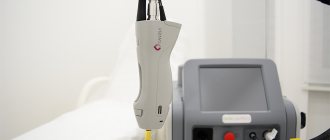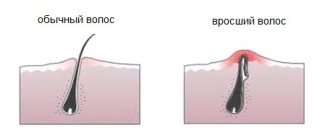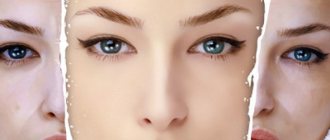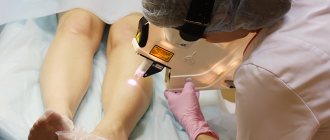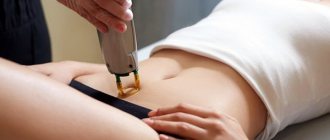Laser hair removal is an excellent method for eliminating unwanted hair. Thanks to it, you can remove them from various parts of the body: on the face, legs and arms, in the bikini area and armpits. Preparation for laser hair removal is of great importance. So, about a month before the procedure, you should not sunbathe, because for the best effect and the absence of burns, the skin should contrast as much as possible with the hairs. Knowing this, many people prefer to remove excess vegetation during the cold season. If hair is supposed to be removed with laser in the summer, then a month before the procedure and a month after it, the skin must be treated with a special sunscreen. For these purposes, a cream with an SPF of 50 units is perfect. It provides 100% protection against ultraviolet rays.
In 4 weeks
4 weeks before laser hair removal, protect the skin from direct exposure to ultraviolet radiation. Avoid visiting the solarium. Avoid using pastes, gels, creams and other products with a whitening effect to restore the natural pigmentation of the skin and hair roots ().
Some experts recommend starting hair removal in winter. This is due to the lack of tanning - the likelihood of damage to the skin is minimized (). Moreover, you have a unique opportunity to get rid of excess vegetation by summer. After 4-6 sessions, hair disappears for several years.
You can get rid of a tan and return your skin to its natural appearance at home using scrubs (). Simple natural scrubs work well - coffee grounds, lemon juice with honey and sour cream, parsley infusion, a mixture of white clay with cucumber juice.
Attention! At Ola centers, hair removal with excellent results and without consequences can be done not only in winter, but also at any other time - lasers are effective for any type of skin and vegetation.
Why is it so important not to sunbathe before laser hair removal?
The desire to acquire a chocolate skin tone is quite understandable. But it's worth putting off going to the beach or tanning studio for a while if you want to say goodbye to unwanted hair thanks to laser. Before laser hair removal, it is necessary to exclude exposure to ultraviolet radiation on the skin for 2 weeks, since under its influence melanocytes produce too much melanin. The skin becomes dark and the effectiveness of the procedure is significantly reduced. In addition, the client is at serious risk of being burned.
It is believed that a light tan obtained simply by moving around the city is not critical for laser procedures. But you can play it safe and use sunscreen with SPF 30 or more.
In 3 weeks
For 3 weeks, avoid mechanical traumatic effects on the skin, including depilation methods ():
- waxing
– hair removal using a wax mixture; - sugaring
- hair removal using thick sugar paste; - threading
- hair removal using a thin thread.
From the third week, do not pluck your hair - tweezers remove part of the bulb, as a result of which the laser is not able to remove it completely. Shaving is permitted as long as the follicle is not damaged by the razor.
Possible consequences and complications
Sensitive skin types may experience redness after hair removal. But don’t be upset, they go away in 3-5 hours. An incorrectly chosen mode of energy exposure to the skin and the incompetence of a cosmetologist can also lead to complications:
- burns;
- activation of herpes;
- allergic urticaria.
If you are planning a vacation, agree separately whether it is possible to do hair removal before the sea. Failure to comply with the regimen recommended after laser hair removal leads to inflammation of the hair follicles. This may occur due to increased secretion of sweat glands. A person may partially lose their vision if they do not protect their eyes with special glasses.
Armpits hurt after laser hair removal
Despite the cooling system in modern laser devices, sometimes the client feels pain after the procedure. It depends on the sensitivity of the skin. Knowing the characteristics of your body, you can ask a cosmetologist for additional pain relief. After the procedure, pain in the armpit area disappears after 2-3 hours. Find out about contraindications and consequences of diode hair removal here.
In 2 weeks
Proper nutrition - a diet based on dairy and plant products - will help reduce discomfort during hair removal. Give up coffee, chocolate, sweets, fast carbohydrates ().
Include the following foods in your diet:
- cottage cheese, cheese, eggs, fermented baked milk and other fermented milk products;
- fresh fruits and vegetables;
- legumes, greens, nuts.
If possible, avoid using bronzing gels, lotions, creams, self-tanners, drugs based on fluoroquinolones, sulfonamides, and tetracycline groups.
Contraindications to the procedure
Laser hair removal has a number of contraindications. It is strictly forbidden to carry it out to the following categories of people:
- with immune diseases;
- with cancer;
- with acute forms of herpes;
- with infectious diseases;
- with individual intolerance;
- pregnant women;
- diabetics;
- persons under 18 years of age.
It is also not recommended for people who have blond, gray or red hair in the area where hair removal is planned. People with dark skin and a fresh tan (up to two weeks) should not go under the laser. A doctor's consultation will be required if you have skin diseases and injuries (burns, abrasions, scratches), acute respiratory viral infections and influenza, numerous birthmarks, varicose veins, and allergies in the acute stage.
Those who have no contraindications to the procedure need to carefully prepare for it so that it is as comfortable, effective and maintains a long-lasting effect. With proper preparation and implementation, with the help of several sessions, you can achieve hair loss for six years or more. 80% of hair can disappear forever. Everything will depend on the specific organism and individual hair growth rates, as well as on the type and power of the laser used for hair removal.
In a few hours
A few hours before hair removal, take a warm bath - this will help the skin steam and make the laser hair removal process easier. Replenish your water balance - the presence of water in the body will reduce redness and irritation after the session.
Take painkillers if necessary. They can be applied locally to the surface of the skin or taken orally. The most popular are anesthetic creams and lidocaine sprays (4%). Ibuprofen is suitable as tablets.
How to care for your skin after
For 2 weeks you should follow the rules that are not recommended:
- visiting the bathhouse and sauna;
- taking a hot bath and sunbathing;
- taking antibiotics and hormonal drugs;
- use of creams containing alcohol and deodorants;
- removing remaining hairs with tweezers or wax.
Daily use of moisturizing armpit lotions will soften the skin and relieve irritation. You should only use the product recommended by the cosmetologist. The result of each procedure will depend on proper care.
Preparation for low pain thresholds
The following actions will help reduce discomfort:
- Discuss with your cosmetologist the choice of a topical pain reliever. This is normal practice!
- Focus on the menstrual cycle. Do not perform laser hair removal during menstruation; during this period, the pain threshold decreases, sensitivity increases, redness, and irritation last longer than usual - up to 24-48 hours ().
- Experts note that the procedure is much easier to tolerate if you are in a good mood. Be positive and throw away bad thoughts. It is better to endure the execution if you are upset about something or tired after work.
- Allow more time for the procedure. Take your time! The calmer you are, the better your skin will respond to the changes. When removing hair, take a deep breath, do not hold your breath.
- Throughout the day, try not to drink alcoholic beverages, strong tea or coffee. Stop smoking. It has been proven that drinks that contain caffeine increase sensitivity to pain several times.
- Don’t keep your emotions to yourself – talk to a specialist about the pain. The specialist will adjust the intensity of the impact.
Maintaining “pauses” between laser hair removal sessions
Laser hair removal involves not one session, but a course consisting of a certain number of sessions. Not a single laser device can rid a client of “excess” body hair in one single time. Light energy affects only those hairs that are actively growing at the time of treatment, so after the first session only 15-20 percent of all hair is removed. Over the next 10 days, hairs will gradually fall out, but others will “wake up”.
With each procedure performed, the amount of unwanted hair will decrease, and the time intervals between sessions should increase. The minimum pause is three weeks, and the maximum is 2 months. It is very important to observe these pauses and not interrupt the course you have started. Otherwise, the effectiveness of laser hair removal is reduced and may disappear altogether. A full course takes about a year. But after all the sessions, the client can forget for a long time about the need to shave or tear off wax strips - for a period of 1-3 years. This period is very individual and depends on many factors. First of all, hormonal levels and heredity.
Preparing for hair removal for different areas of the skin
Let's consider the features of preparation before hair removal on different parts of the body.
Armpit area
Shave the armpit area 2-3 days before visiting the beauty center. It is important to grow hair in this area not in length, but in quantity - this way it will remain visible and can be easily processed with a laser ().
On the day of hair removal, avoid using deodorant. Don't forget to take dry and wet wipes (without alcohol).
…
Deep bikini area
3 days before the session, perform skin scrubbing and shave hairs to a length of 3 mm.
Areas for laser hair removal ():
- pubis;
- inner thighs;
- labia majora;
- between the buttocks.
If you want to make an intimate haircut, first outline its outline. Shaving should start from the bikini area, then move on to the labia and buttocks.
…
Face area
Complete removal of facial hair usually requires 4 to 6 sessions.
A few days before the procedure, avoid chemical peeling, acid masks, and alcohol-based cosmetics.
The day before the session, do not use serums or anti-aging cosmetics. For night moisturizing of the skin, a light mask in the form of a cloth or gel with a kefir base is suitable.
On the day of hair removal, avoid powder, foundation and other cosmetics ().
…
What devices are used for hair removal?
Epilation can be performed using different devices. There are four main types of laser:
- Ruby is the very first device that was used for depilation. The energy it conducts removes hair, growths - warts, papillomas. It can be used to treat the initial stage of varicose veins. Modern cosmetologists do not use ruby models due to the high risk of burns. The ruby laser procedure is the most dangerous, but the cheapest.
- Alexandrite is used to remove light and dark hair. The target for the laser is melanin and water in the follicle. The Alexandrite apparatus works on alexandrite, a mineral stone. This is its working environment in which electrical voltage is converted into a laser beam.
- A diode laser differs from an alexandrite laser in its working environment. There are no minerals in it and the device runs on LEDs. It allows you to remove all types of hair on the armpits, groin area and legs. It also eliminates small vascular patterns. This type is often used in cosmetology.
- The neodymium machine works using long-pulse neodymium units for hair removal and short-pulse neodymium units for tattoo removal.
Number of required procedures and interval between sessions
When choosing laser hair removal for the armpits, many women are interested in how many procedures they need to undergo to achieve the effect of absolutely smooth skin.
The number of necessary procedures depends on many factors and is determined individually. After the first procedure, the cosmetologist will be able to name the approximate number of sessions, but it is difficult to determine the exact number at first . Usually 7-8 procedures are enough, but in some cases 10-12 sessions may be needed.
After the first treatment, hairs will not begin to fall out immediately, but after 15-20 days. Then, after each hair removal session, the number of hairs will decrease, and the hair itself will lighten and become thinner than usual. New hairs will appear less and less until they disappear completely.
The cosmetologist will also prescribe the required interval between sessions, based on the type of laser, hair thickness and color. The average is 6 weeks.
Diode laser: indications and contraindications
Indications for contacting a cosmetologist for hair removal with a diode laser are:
- thick hair in unwanted and hard-to-reach places: on the face, groin, intergluteal area, armpits;
- excessive hair growth;
- skin sensitivity to other removal methods: irritability, redness, ingrown hairs;
- excessively hard hair structure.
There are also contraindications that should be taken into account when planning diode laser hair removal and preparing for the procedure:
- removal will have to be postponed during pregnancy and breastfeeding;
- refuse a session if there are an excessive number of moles on the skin area;
- the procedure is impossible for a number of diseases: herpes, epilepsy, varicose veins, cancer, diabetes;
- taking antibiotics;
- fungal skin infections, psoriasis and other infections;
- Be sure to reschedule the session if your skin is tanned.
It is important to follow the recommendations of a specialist who will not take on the job if one of the signs listed above is present.
